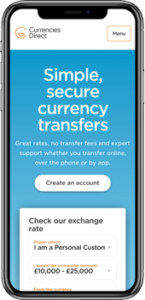While Market Orders share similarities with Limit Orders, they are not the same thing. A Market order permits a brokerage to trade on a client’s behalf at the best available exchange rate on a specific currency pair, on a specific date. Limit Orders hold back payments until a specific rate hits. A Market Order is an excellent tool for companies with international payments that are time-sensitive, such as monthly vendor payments. The company maintains flexibility by trying to reach a target x-rate, but as the payment has to be made on a certain due date- the payment company will release it at best possible timing . Once a client gives a Market Order to a payment firm, the client can rest assured that the brokerage will only execute payment at the best possible market rate available.


Currencies Direct Financial Market offers Market Orders as part of their cross-functional risk management strategy. The Market Orders on Currency Direct is not an automated feature of the platform, and clients can set it up via the client’s personal accounts manager. With Currencies Direct, clients receive expert advice from a qualified account manager. They also get personalized service, which allows for flexibility in the number of currency pairs and transactions.



CurrencyFair provides you an innovative marketplace that gives you flexibility and helps you manage market volatility. It’s easy to set the exchange rate you want, wait for your trade to be matched, and get a better rate. Unlike most money transfer companies, CurrencyFair offers you a choice when it comes to trading currencies:
1. You can exchange right now at the best available rate
2. Request a higher rate and when it is reached, your transfer will take place



It is quick to set up online a Market order on the XE platform. The user enters their currency, the transfer amount, and the preferred rate. The process then automates. When the best rate goes live, it triggers the payment. This feature is available on the XE’s mobile app for convenience.



The FX Option feature is similar to a Market Order. It allows clients to set up future payments at specific rates and times. It is a flexible option that doesn’t automatically execute the payment but rather gives the client the option to do so every time in a recurring manner. Thus, the client gains more control as each payment is verified before it is released.



WorldFirst offers an all-inclusive, user-friendly mobile app for quick access to securing Spot Contracts. It has live access to currency markets and a dedicated team of experts that continuously finds the best possible rates. They only accept wire transfer payments and complete a Spot Contract within two days of receiving client funds. WorldFirst has a sliding scale for transparent transfer cost – between 0.15% and a max of 0.5%. It’s important to note that there is a minimum transfer amount of $1,000.

Using providers that offer both Market Orders and Limit Orders will ensure that a business benefits when making time-sensitive or rate-sensitive payments. Go To Full Comparison